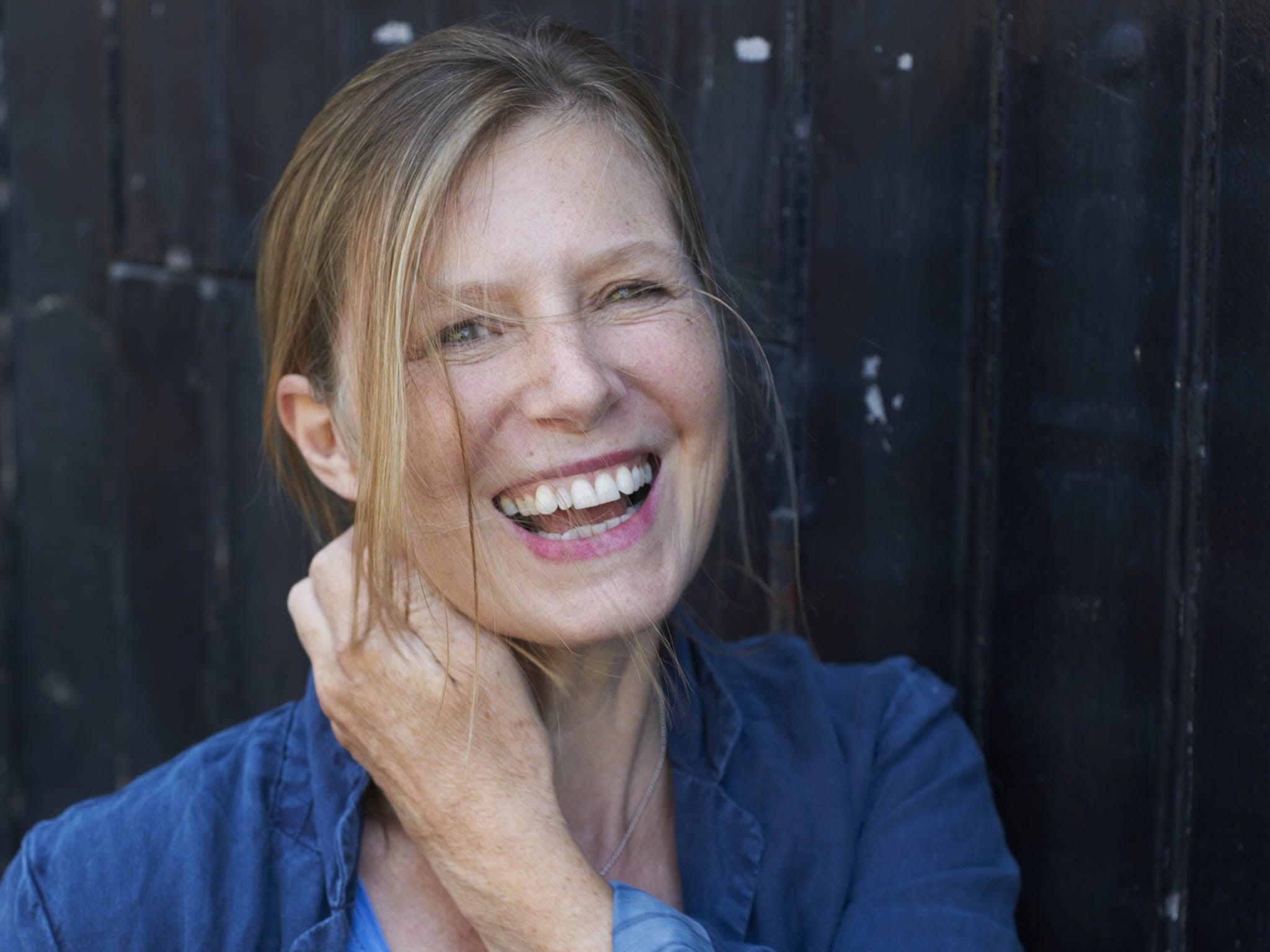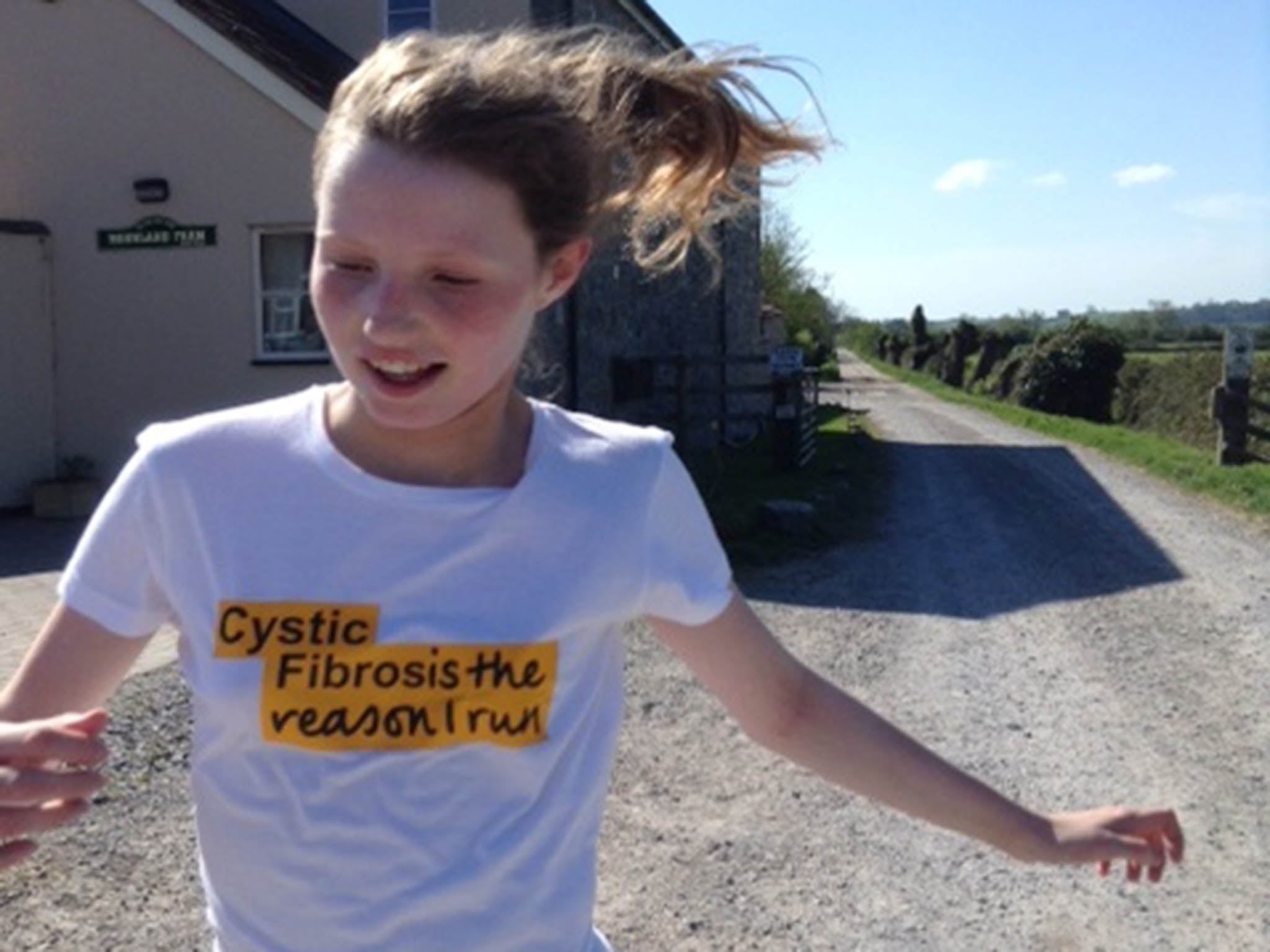Cystic fibrosis: Why my child struggles more with people's fixation on her condition than the illness itself
When she was a baby and we were first told that Clara had cystic fibrosis, the outlook seemed very bleak indeed

My daughter has just come in from running 5km across the Mendip hills and we are reading proofs of a memoir I’ve written about her illness. The proof reader has made suggestions in the margin. Which would we prefer – life-threatening? Life-shortening? Life-limiting? We consider the three terms with a dismay we rarely feel for cystic fibrosis itself. None of them seems to fit.
When she was a baby and we were first told that Clara, now 14, had cystic fibrosis, the outlook seemed very bleak indeed. When a doctor tells you what’s wrong with your baby, you don’t expect them to add the tag: no known cure. By the time she was in her twenties, Clara’s lungs would be worn away by infection. She would have repeated stays in hospital. She might get a lung transplant. She might survive into her thirties. Carry on with your lives, the doctors told us. She was my first child, and by the time she was diagnosed I’d already missed all the mother-and-baby groups, she’d been so ill. On the one occasion I’d taken her to NCT coffee morning, I’d left after a few minutes, unable to face the other mothers and what seemed to me, but quite rightly not to them, their tiny problems about nappy rash and latching on. Life-threatening had become the new normal.
Once she started on the treatments, we found ourselves welcomed into the mother-and-young-child world. No one could tell, by looking at her, that she had what the text books called “this devastating disease”. When she was four, I was asked to go and talk to a Cystic Fibrosis conference about my hopes for my daughter. I hadn’t planned what I was going to say. I stood up and said, “When I last saw Clara, she was hanging from the climbing frame, upside down,” meaning that she’d been in the garden playing with her friends, a normal, boisterous child. But before I’d finished the sentence I heard a stifled scream from the back of the room. They thought I’d been going to say something terrible.
Do what you would have done anyway, the doctors continued to say. So we had another baby, and moved to France. Clara learned to sing, to play the piano, to read, to climb trees, and it soon became clear she was as lively and demanding, excitable and passionate as any other child. When I was asked to speak to a mother of a newly diagnosed child, I was able to say, by the time Clara was seven or eight, “We have a normal life.” We didn’t, actually. She, her sister Verity, her father and I, had a normal life plus CF life. Vigilance and treatment were part of every “normal” day: half an hour, at least, of physiotherapy, and at meals, a dish full of background pills, even when she didn’t have a lung infection.
In France, she visited the physiotherapist every lunchtime for several years. For the first few years, her friends often asked to come with her. They were completely un-squeamish about the process, watching the therapist compress and coax Clara’s lungs, to clear the passageways of obstruction due to infection. But as they progressed through the primary school, attitudes changed. A popstar who’d made his name by winning the French equivalent of The X Factor had died of cystic fibrosis. He was very good-looking, so he was often on the cover of magazines. “Tu vas mourir a vingt ans,” they began saying to Clara. At the time, I was translating a book called Tomorrow I’ll be Twenty. Every morning when I went to my desk, I felt sick with the thought of it.

From the beginning, I dreaded Clara learning about the life expectancy of people with CF. I refused to believe it. I didn’t want her to know. She’d always been compliant, taking her pills and following her treatments, being polite to the doctors and nurses, physiotherapists, dieticians and psychologists she saw at her three-monthly check-ups. She’d understood that she had to do all this to be well; that she had to avoid stagnant water, hothouses, germs in general, people with bad colds and coughs. That since her pancreas didn’t work either, she needed to eat a good 50 per cent more than other people. One day, she came home from school and said that a child had told her she would die when she was 20. “Is it true?” she said. “No,” I told her. “I don’t believe that. I believe they’ll find a cure.” “That’s good,” she said, “because I’m busy.”
Before a five-day school trip to the sea, she gave a presentation to several classes. After she’d done her presentation, they all asked questions. Or rather, they mostly asked the same question: “When are you going to die?” “I don’t know,” she said, looking them straight back in the eye. “When are you going to die?” “When I’m 80! 90!” “Yes, over there? Anyone?” said the teacher. “I’m going to live till I’m 100!” “You might not,” Clara said. “You might get run over by a bus.” Suddenly, the excited chatter and inquisitiveness turned to silence, as though she’d pronounced a curse.
Shortly after that, she had her first stay in hospital. She was off school for three weeks and returned with a little bottle of antibiotic fluid in a sling, connected to a line going into her arm. In that short time, everything seemed to have changed. The curse had to be reversed, turned back on her. I remembered with horror that when I was little the children had played a game in the playground. Someone was declared infectious. Usually someone fat, foreign or unpopular. Before the infectious person could tag you, a friend had to swoop by and tap you first, shouting “injection!” I began to realise that unkindness, mockery, isolation, and not just the malfunction of salt molecules in her body, as we’d been told, could threaten Clara’s life.
It seemed to me that the children’s behaviour towards Clara changed as they came in sight of puberty. There was a new kind of jostling for position, an excitement to be derived from banishing and belittling others. It’s normal, the headmaster said, these are just children growing up. It appalled me to think that this was a foreshadowing of adulthood. It was almost as though, believing Clara would never get the chance to replicate her faulty genes, the group had decided she could be sacrificed. Self-appointed leaders, who weren’t even popular, or nice or interesting, had tapped precociously into an adult code that gave them power. I love France, but I came to see it as a country in which conformity is upheld as a civic virtue, and in which all values are civic. We looked in vain to teachers and parents to give the lead on the kind of caring, imaginative, un-judgemental behaviour she was going to need to survive the next few years emotionally, let alone physically.
Eventually, these considerations, plus misgivings about the French education system, brought us back to England, where the children now attend a Quaker school. Clara runs. She sings. She has strong opinions about injustice, politics, and, understandably, the importance of not stereotyping others. New treatments for cystic fibrosis have recently leapt onto the scene, radically changing her life, and her expectation of how, and how long, she may live. This ordinariness – the unthreatening, un-shortening, un-limiting way of life she enjoys – depends not just on her own determination to make the most of the gift of life she’s been given, but on the willingness of others to let her live without a label, a best-before date, or shelf life stamped on her forehead. More than ever I believe in Richard Dawkins’ warning: that “we must teach our children altruism, for we cannot expect it to be part of their biological nature”.
Love Like Salt by Helen Stevenson (Virago, £14.99) is out now
Join our commenting forum
Join thought-provoking conversations, follow other Independent readers and see their replies
Comments
Bookmark popover
Removed from bookmarks